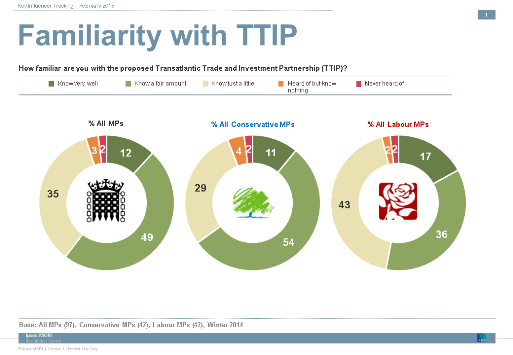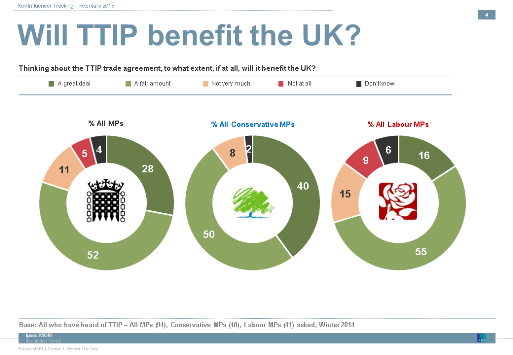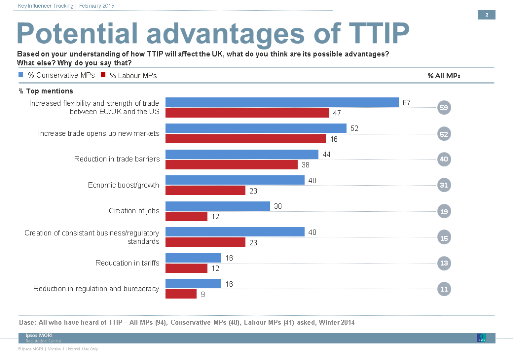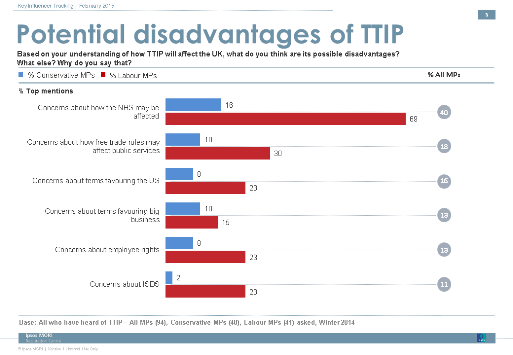TTIPing over the edge

In light of some of the recent media coverage of the Transatlantic Trade and Investment Partnership, more commonly known as TTIP, and the fact it has increasingly been namedropped as an election issue, I thought I would revisit some data we collected in December 2014 about MPs’ awareness and attitudes towards the treaty.
Some background first. In 2013, after two years of discussion, a working group of EU and US politicians concluded that a bilateral trading agreement was needed to cut the regulatory barriers and reduce the tariffs that currently restrict the flow of trade across the Atlantic. Since then politicians from the US and members of the EU Commission have been negotiating a treaty that is now known as TTIP.
In the last few months the proposed treaty has attracted a huge amount of negative media coverage in the UK, with many of those attacks coming from the left-leaning media. More importantly however it has been criticised by the Business Select Committee, who accused the Government of over-stating the potential financial benefits that TTIP would give to the EU (quoted at £100 billion) and requested a comprehensive review of the potential benefits and risks that the treaty poses to different industry sectors.
Criticism has also been seen in Brussels. Partially this is due to the fact that the TTIP negotiations have been happening under a veil of secrecy, The level of perceived secrecy was such that MEPs have protested outside of the treaty’s reading room and several major NGOs have pushed for a maladministration investigation because key documents have not been released.
With this as the background, it’s no wonder that TTIP is starting to be talked about as an election issue, albeit more for political anoraks than the mainstream. The first question, particularly given perceived secrecy levels, is just how familiar are MPs with the treaty?

The results are mixed – while it is good that nearly two thirds of MPs overall (61%) know at least a fair amount about TTIP, it is a perhaps a little worrying that a third of MPs know little, or less, about such a major international treaty, especially given the controversy surrounding it.
That said, of those who are familiar with TTIP the vast majority (80%) think that TTIP will benefit the UK in some way, and only one in six MPs, mainly Labour, think the opposite. Beyond that though, how will TTIP benefit the UK? What advantages, and indeed disadvantages, will it provide the UK?


To MPs, the main benefit is self-evident. TTIP will mean stronger and more flexible trade links across the Atlantic and increase the likelihood of new markets being opened up. In fact there is still solid, cross-party recognition, of many of the potential advantages that TTIP offers.
Given that many MPs support free trade as a principle TTIP has, on the surface at least, significant appeal. MPs see TTIP as not only increasing the volume of trade but also improving efficiency and creating jobs. Furthermore, given that the US is often regarded a tricky place to do business, from the point of view of dispute resolution, regulation and industry standards, anything that helps to remove these barriers is regarded as a positive. The British, and by extension the European, car industry was cited as a particular example of this. As one Conservative MP pointed out –”I have a big car manufacturer in my constituency who make lovely cars but they are unable to export them to America because America has different standards in terms of emissions, and each state has its own testing regime. These are huge barriers to trade between the UK and the US in this sector and TTIP will go a long way to getting rid of these”.
Inevitably, given that Labour MPs are less likely to see the benefits associated with TTIP than Tory MPs, it is unsurprising that it is Labour MPs who are the most likely to see potential disadvantages in TTIP. This is not surprising – Conservative MPs are more likely to be champions of free trade while Labour MPs are more likely to have heard or read some of the anti-TTIP narrative that has been circulating in the left-wing media. But what are these disadvantages, and to what extent do the disadvantages that MPs identify correlate with the media coverage TTIP has been attracting?

The main thing to point out, and one that is unsurprising for anyone who has been following the media coverage of TTIP, is that the most frequently mentioned disadvantage in the eyes of MPs is the perceived threat that TTIP poses to the NHS.
The second thing worth pointing out is that the Investor State Dispute Settlement, better known as ISDS, which is the subject of much of the opprobrium levelled at TTIP by those who have taken the time to study the fine-print of the treaty, is only mentioned by one in ten of MPs.
Let’s start with the issue of how TTIP is believed to be a threat to the NHS. The first thing to say is that the precise nature of this threat is hard to pin down. Many of the arguments focus on the belief that if TTIP passes without a specific NHS exemption then NHS services that are currently privatised could not be made public again without the potential for legal action under ISDS. Sitting alongside this is the belief that the Conservatives will continue to slowly privatise the NHS. When these two ideas are side by side it is easy to understand how people can become hostile to TTIP. That said there are plenty of maybes in all of this. So how do MPs talk about TTIP in relation to the NHS?
Some believe that the threat is more theoretical than actual, and that the coverage has been exaggerating slightly:
“There has been a whipped up hysteria painting a picture which is not realistic. The suggestion is that this would lead to American companies privatising the NHS but I don't believe that is the case” – Liberal Democrat Backbencher
“There is a group of people that think that American healthcare providers are going to come in and take over half the NHS, that is the campaign, and that basically is very questionable whether that will happen” – Conservative Backbencher
Others believe that the threat is more real:
“I am concerned about the potential effect of TTIP upon our public services and in particular the NHS. The NHS is largely a monopoly, and there are very good reasons for retaining it as a monopoly. It integrates care, it achieves better economies of scale and it achieves better health outcomes than any other health service in the Western world. If this was disturbed by being cannibalised by the private sector, most of which would not have a base or presence within the UK, then it would spell the end of the NHS.” – Labour Shadow Minister
“There has been great controversy around NHS services specifically whether or not it gives open access to American public health companies to cherry pick some of the contracts,. Everybody says it will not happen but there is a fear there is a loophole that would allow them to do that” – Labour Backbencher
Of those who do believe that there is a potential threat to the NHS very few propose any form of action that might counter it. This is likely due to the fact that the potential threat is still fairly vague and that without more information MPs are reluctant to put forward concreate actions. The few who do propose that the NHS should be excluded from TTIP tend to bring up our next point – ISDS.
Put simply, ISDS is designed to be a legal mechanism that helps to prevent governments from enacting legislation or regulation that will curtail the ability of a company to operate in that country. Depending on the circumstance this is either a good thing, as it enables companies to operate internationally, or it is a bad thing that severely limits the ability of a country to regulate industries operating within their own borders. George Monobiot and Owen Jones, like many of those who oppose TTIP on principle, are hugely opposed to the implications that ISDS has for the UK in general and the NHS in particular. In the last few days even the UN has waded into the debate, sharply criticizing TTIP because of the threat that ISDS poses to the democratic process.
At the moment however, there is only a small group of MPs who agree with this sentiment, and a few others who have yet to receive the answers they want or need:
“The way in which it would appear to operate is that private companies could access the courts to force public sector organisations to do things that they don't want to do” – Labour Backbencher
“It will allow big companies to sue the NHS for profits that they haven't received, I found this difficult to understand when raised by a constituent but when I looked into this I haven't yet received the reassurance I would like because it does appear that there is proposed to be some court of arbitration where people might be able to bring cases” – Conservative Backbencher
So it clear to see that MPs who are aware of ISDS are worried about its implications. Despite this, few go as far as to call for the NHS to be excluded from TTIP. These concerns have not gone unnoticed in Brussels however. Towards the end of February, Cecila Malmstrom, the EU Trade Commissioner, promised to add further safeguards into the treaty by limiting the scope of ISDS and also committing to exclude all publically-funded healthcare services from TTIP. While viewed by many as a step in the right direction, without a specific exclusion for the NHS from TTIP, some feel that the proposed amendments would not shield the NHS from being further privatised.
Where does this leave the treaty? The Conservatives have said that there is no threat to the NHS from TTIP and they will be monitoring the treaty negotiations closely. They have not asked for the NHS to be specifically excluded from the treat and have instead focused more on the possible advantages of the treaty, especially from an economic perspective.
Meanwhile Labour, the Liberal Democrats and the SNP have all called for the NHS to be specifically excluded, and all three are prepared to denounce the treaty if any real threat to the NHS materialises. The Greens have gone further, attacking not only the potential threat to the NHS but also any aspects of the treaty that weakens protections for workers, consumers or the environment.
Outside our borders, TTIP faces other problems. Syriza, the leaders of the new Greek government, have sworn never to ratify the treaty and other countries around Europe are expressing concerns about various aspects of it. There are pitfalls in the US too – in a post-Obama political landscape, there may well be less of an appetite for TTIP in its current form, let alone on its current timetable.
TTIP is therefore a long way from being the finished article, and the number of barriers between its current state and its future ratification are increasing. It is likely to change significantly in the coming months, and the impact it ends up having, if and when it is ratified, will likely differ somewhat from what was originally planned. While these results give an indication on what MPs think of TTIP as it stands now, we shall have to see what the treaty ends up looking like before challenging MPs to state exactly where they stand when it comes to opposing, or supporting, this treaty.
Ipsos’s MPs survey runs twice annually, interviewing a representative sample of c.100 MPs from the UK House of Commons. Interviews are conducted face-to-face.



